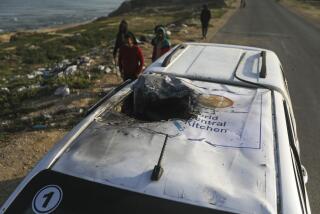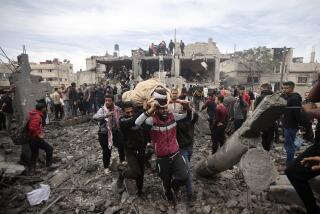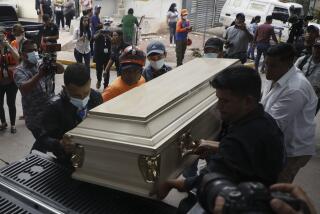Killers of 3 Aid Workers Are Shown Leniency
- Share via
JAKARTA, Indonesia — When a mob of angry Indonesian militia members attacked a U.N. office in West Timor last September, Julius Naisama was in the lead.
First he encountered Pero Simundza, an aid worker from Croatia, and stabbed him in the stomach, prosecutors told an Indonesian court. Then he came across Carlos Caceres, an American, and stabbed him too, they said.
On Friday, Naisama was convicted of conspiring to foment violence for his part in the attack that claimed the lives of three foreign aid workers.
His punishment: 20 months in jail.
“I accept the sentence with pride because I did what I did to defend [Indonesia’s] red and white flag,” Naisama said after the sentencing.
Of six militia members tried in the killings, Naisama received the harshest punishment. The other five--including one who prosecutors said stabbed aid worker Samson Aregahegn of Ethiopia--received sentences ranging from 10 to 16 months.
The Indonesian court’s leniency brought angry condemnation from the Office of the United Nations High Commissioner for Refugees, or UNHCR, which had sent the three aid workers to the troubled island to help people who had fled the violence in neighboring East Timor.
“The sentences make a mockery of the international community’s insistence that justice be done in this horrific case,” the agency said in a statement released in Geneva.
The case became notorious in part because of the brutality of the attack. The mob stabbed and hacked the three victims to death, then dragged their bodies into the street and set them on fire.
The killings were among the worst in the history of the refugee agency. Faced with rising attacks on aid workers around the world, the UNHCR has called on governments to increase efforts to protect relief workers in the field.
“Today’s sentencing sends the opposite message,” the U.N. agency said. “It flies in the face of world opinion and is an affront to the memory of those humanitarians who have given their lives in the service of others.”
The verdicts highlight Indonesia’s dysfunctional legal system, in which major crimes committed by the politically well-connected often go unpunished while vigilante mobs execute thieves on the street for as little as stealing a chicken.
The sentences also underscore Indonesia’s lack of action in pursuing human rights violations for the killing of hundreds of people in East Timor by militias sponsored by the nation’s military.
After the people of East Timor voted overwhelmingly in August 1999 in a U.N-sponsored referendum to become independent, the pro-Indonesia militias ran amok, killing opponents, burning buildings and driving hundreds of thousands of refugees across the border into West Timor.
The militias, who portray themselves as Indonesian patriots, set up their operations in the West Timor refugee camps, where they terrorized many of the residents and resented the foreign U.N. workers who helped provide assistance.
On Sept. 1, the Indonesian government named 19 suspects--including military commanders--in the violence that had ravaged East Timor. No trials have taken place. But several days after the list was issued, one of the suspects was killed near the town of Atambua, sending the militia members on the rampage. Witnesses said the mob came to the U.N. office in Atambua on Sept. 6 looking for foreigners to kill.
Judge Anak Agung Gede Dalem, who tried the six defendants in Jakarta, the capital, for the killings of the aid workers, told the court: “It has been legally and definitely proved the accused . . . did the brutal act in public against people that resulted in death.”
However, in a seemingly contradictory finding, he rejected murder charges because the killings were carried out by a mob, “which makes it difficult to determine the perpetrators of the deaths.”
Another mitigating factor the judge cited was the defendants’ unhappiness over the result of the East Timor referendum granting the territory independence. A U.N. representative called that “particularly outrageous.”
The defendants could have received up to 34 years in prison, but prosecutors sought sentences of only 18 to 40 months. Mulyohardjo, a spokesman for the attorney general’s office, said it is unlikely the government will appeal.
He defended the judge’s decision to reject murder charges because the U.N. workers squared off to fight when the mob approached. “I see that it was not pure,” said Mulyohardjo, who like many Indonesians goes by one name. “Actually, the action was reciprocal.”
According to the prosecutors’ account, about 1,000 militia members and supporters gathered in Atambua that day. The crowd split in two, with one group going to the U.N. office.
When Naisama approached the building and met Simundza, he told the U.N. worker to go inside, but the Croatian showed a “defiant attitude,” so Naisama hit him, prosecutors said. When Simundza ran, Naisama chased and stabbed him.
Next, Naisama entered one of the offices and saw Caceres “ready to fight back.” So Naisama stabbed him.
Three other defendants, Jose Francisco, Joao Alves da Crus and Joao Martins, went into the office and met Aregahegn, who was holding a stick, according to prosecutors. Martins threw a rock at the Ethiopian’s chest, forcing him to drop his club, and the other two stabbed him.
Defendant Serafin Ximenes piled papers and car tires on the bodies and set them on fire, prosecutors said.
Francisco and Da Crus were sentenced to 16 months each. Ximenes received 15 months. Martins and the sixth defendant, Xisto Pereira, received 10 months each.
All six have been in jail for seven months and will get credit for time served. That means Martins and Pereira will be free before the first anniversary of the slayings.
The killings were a major embarrassment for Indonesian President Abdurrahman Wahid, who was at the U.N. headquarters in New York for a meeting of world leaders at the time. He told reporters then that the timing of the attack was intentional.
“The purpose was to humiliate me,” he said.
Wahid had no comment on the sentences, a spokesman said.
U.N. officials have said they had assurances from the Indonesian police that they would protect the U.N. workers. Police counter that they warned the U.N. staff to leave before the mob got there.
The tragedy of the killings was brought home by an e-mail Caceres wrote to a friend just before the mob arrived.
“The militias are on their way, and I am sure they will do their best to demolish this office,” wrote Caceres, a native of Puerto Rico. “We are waiting for this enemy, we sit here like bait, unarmed, waiting for [the] wave to hit.”
More to Read
Sign up for Essential California
The most important California stories and recommendations in your inbox every morning.
You may occasionally receive promotional content from the Los Angeles Times.













